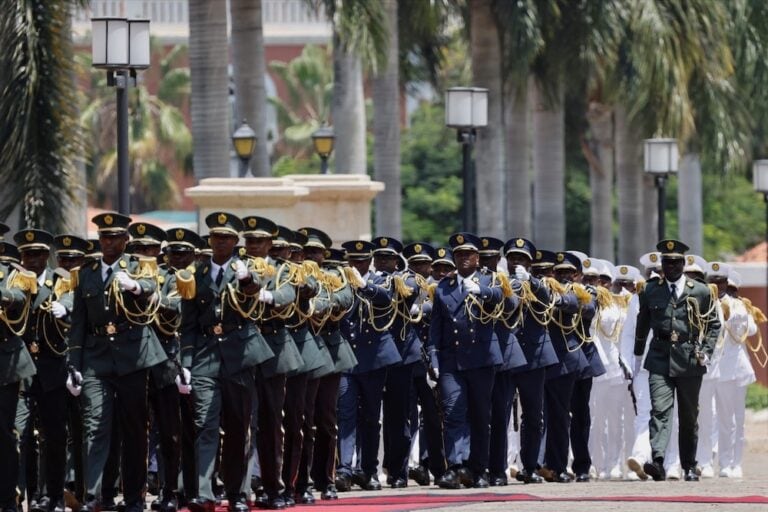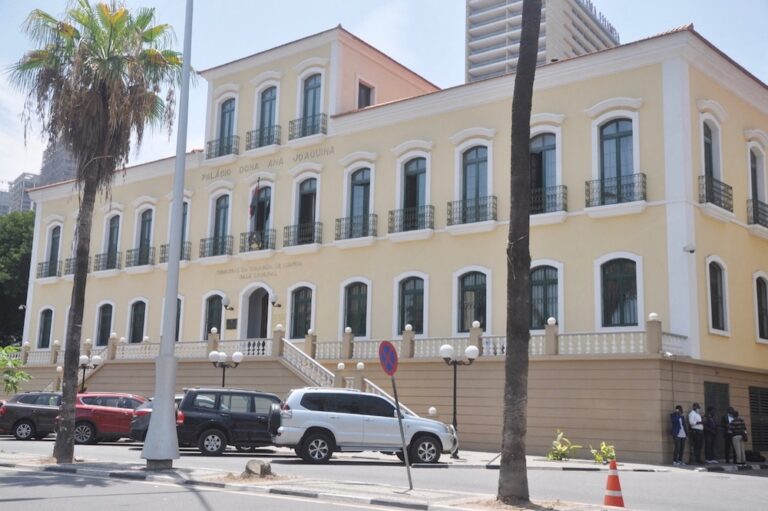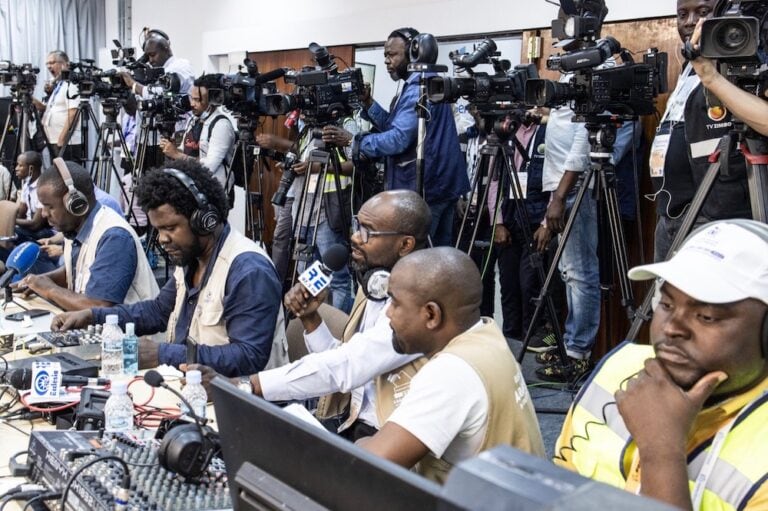Public media journalists in Angola are prone to attacks by people who are angry at their perceived bias toward the government and ruling party.
This statement was originally published on cpj.org on 18 January 2022.
Angolan authorities should ensure the safety of journalists covering protests and investigate recent incidents of assault, the Committee to Protect Journalists said today.
On January 10, six reporters working for news outlets TV Zimbo and TV Palanca were assaulted by unidentified people and forced to flee to safety while reporting on a nationwide strike by taxi drivers in the capital Luanda, according to media reports and the journalists, who spoke to CPJ by telephone.
The nationwide strike was in protest of COVID-19 restrictions, the poor state of roads, demands for social security benefits, and a call for the end to alleged extortion by police, according to media reports.
TV Zimbo reporter Telmo Gama and his cameraman Justino Campos, and TV Palanca reporters Anselmo Nhati and Orlando Luís and cameramen António Luamba and Daniel Lutaka, were covering the protest when some people among the protestors turned on the journalists and called the TV Zimbo crew ‘sellouts,’ the journalists told CPJ. The protest quickly turned violent, and they were forced to leave.
The secretary general of the Journalists Syndicate, Teixeira Cândido, told CPJ over a phone call that public media journalists are increasingly becoming the targets of people’s anger because of the perceived bias toward the government and ruling party. TV Zimbo and TV Palanca were nationalized by the Angolan government in mid-2020, as documented by CPJ.
“As shown by the recent attack on the TV Zimbo and TV Palanca news crews, reporters appear to be scapegoats for some citizens’ perceived anger toward the state,” said Angela Quintal, CPJ’s Africa program coordinator. “CPJ is increasingly concerned that the environment for media freedom in Angola is deteriorating as the country approaches elections later this year. The press should be allowed to do its work free from intimidation and risk of assault, so that all Angolans can enjoy their right to a diversity and plurality of news and information.”
Around 7 a.m. on January 10, Campos was first to arrive at the main taxi rank in Luanda’s suburb of Benfica, as the drivers began preparations to block roads, he told CPJ. Initially, demonstrators welcomed the media attention, saying they should report on what was happening, however, attitudes changed when he began filming the vandalism and arson attack on a building owned by the ruling People’s Movement for the Liberation of Angola (MPLA) party.
“Someone started to shout that we were ‘sellouts,’” Campos said, adding that he and Gama left the scene to try and find a safe spot to do their reporting. Gama told CPJ that he was holding a microphone with the Zimbo TV logo while Campos held the camera when they were again confronted by protesters and street vendors who joined them in pushing the journalists and yelling insults.
Protestors set documents and equipment from the trashed office on fire; Campos was punched at least four times on his left shoulder and a burning MPLA T-shirt was thrown at him, according to Campos.
“I wasn’t seriously harmed physically, but I feared for our lives when I realized petrol was thrown at our backs, as we were rushing towards the nearby police station,” Gama said.
About five protestors tried to protect them by escorting Campos and Gama to the police station, just a few meters away, while telling the other protestors that the journalists were merely doing their jobs, the journalists told CPJ. Campos and Gama said there were no police at the scene of the protest.
Around 9 a.m., Luis and his TV Palanca crew arrived at the scene and positioned themselves to film the burning office and vandalism, Luis told CPJ. People in the crowd of protestors began throwing rocks at a Ministry of Health bus before setting it on fire, forcing passengers to flee for their lives, he said.
Luis and his crew were punched by people who tried to take their equipment, Luis said, adding that someone soaked him with petrol and when he turned around, he saw someone lighting a match. “I was lucky the match fell to the floor when someone bumped into him, and before he could throw it at me,” Luis told CPJ.
Nhati told CPJ that he was grabbed from the back, had an arm wrapped tight around his neck for about 30 seconds, and was kicked in the legs by an unidentified man who tried to take him to the ground. Nhati tried to flee but became entangled in his microphone’s long cable. Luis grabbed the mic while Nhati tried to pull free, and when one of the attackers tripped and fell, Nhati was able to escape, he told CPJ.
Luis said he was saved by a transit policeman who put his arms around the reporter’s head, as seen on video footage reviewed by CPJ. The policeman escorted him and Nhati to the police station as bottles and other debris were thrown at them.
Luamba and Lutaka told CPJ they saw their colleagues pelted with bottles and petrol, so they ran for safety to a nearby petrol station with private security guards, in the opposite direction, adding that they were unharmed.
Luamba and Lutaka joined Nhati and Luis at the police station for around two hours before returning to their office to work on their reports, according to Nhati.
Luis said he covered the taxi drivers’ strike the week before, interviewed the organizers, and did not believe the taxi drivers were to blame for the violence, but instead “politically motivated people” who were taking advantage of the protest. Manuel Faustino, president of the Luanda’s Taxis Association, agreed on a phone call with CPJ, adding that the strike was about “workers’ rights,” and the association “vehemently condemned” the violence.
The National Police said “the moral instigator” of the vandalism and assault of a Palanca TV journalist is in detention, according to a news report. None of the journalists laid charges with the police, who have arrested at least 29 protesters accused of vandalism and damage to property, according to news reports.
Contacted by telephone, Nestor Goubel, spokesperson for the national police in Luanda, declined to comment on CPJ’s request for information on the demonstrators who attacked the journalists, instead referring CPJ to his earlier interviews on the subject before hanging up.



